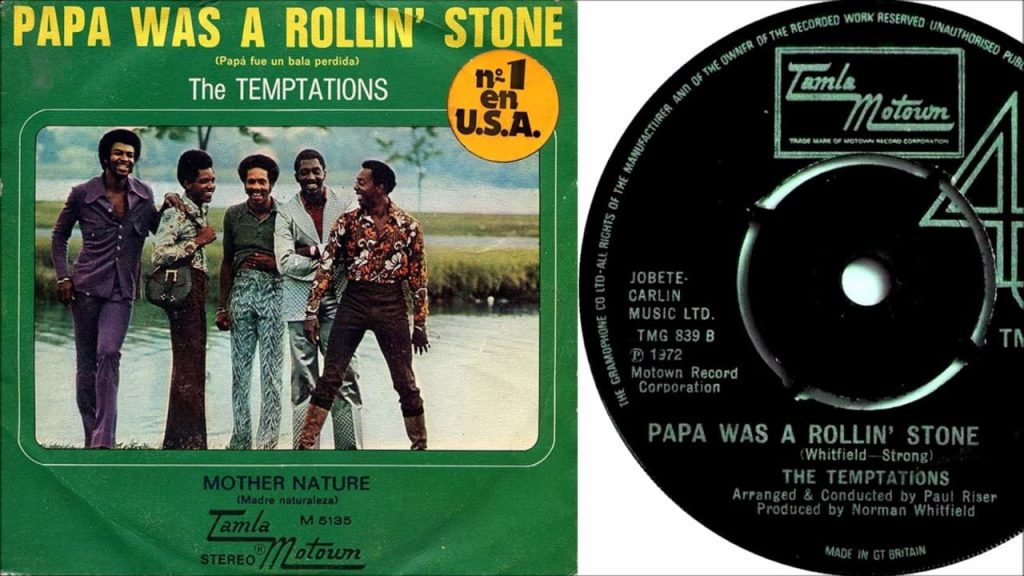
The Temptations’ “Papa Was a Rollin’ Stone”: A Soulful Masterpiece of Mystery and Emotion
The Temptations’ “Papa Was a Rollin’ Stone” is not just a song—it’s a cinematic journey. Released in September 1972 as a single from their album All Directions, the track became one of the most groundbreaking and influential recordings in the history of Motown. Clocking in at nearly 12 minutes in its full album version, the song weaves a tale of family strife, societal pressures, and personal reflection, set against an unforgettable funk-soul groove.
Written by the legendary songwriting team of Norman Whitfield and Barrett Strong, “Papa Was a Rollin’ Stone” earned The Temptations their fourth Grammy Award, including Best R&B Vocal Performance by a Group. It also reached #1 on the Billboard Hot 100, cementing its status as a timeless classic that resonates as much today as it did upon its release.
The lyrics of “Papa Was a Rollin’ Stone” tell a deeply personal and emotionally charged story. Delivered with aching intensity by the group’s vocalists, the song recounts the perspective of a child grappling with the legacy of an absent father. The opening line—“It was the third of September / That day I’ll always remember, yes I will”—sets a somber and reflective tone, as the narrator recalls the day they learned of their father’s death.
What follows is a tale of heartbreak and disillusionment. The father, described as a “rollin’ stone” who left behind a trail of trouble and broken promises, becomes a symbol of pain and lost potential. The refrain—“Papa was a rollin’ stone / Wherever he laid his hat was his home”—echoes as both a lament and an indictment, capturing the complex emotions tied to familial relationships.
Musically, “Papa Was a Rollin’ Stone” was a radical departure from The Temptations’ earlier work. Known for their lush harmonies and romantic ballads, the group embraced a darker, more experimental sound under the guidance of producer Norman Whitfield.
The track opens with an extended instrumental section—over four minutes of hypnotic basslines, shimmering strings, and haunting horns—creating an atmosphere of suspense and anticipation. Whitfield’s use of orchestration was groundbreaking, blending funk, soul, and psychedelic influences into a sprawling and immersive soundscape.
The vocal arrangement is equally innovative. Each member of The Temptations takes turns delivering lines, creating a sense of dialogue and shared emotion. The sparse, deliberate delivery of the lyrics heightens the drama, allowing the weight of each word to sink in deeply.
“Papa Was a Rollin’ Stone” became an instant hit, topping the Billboard Hot 100 and the R&B charts. Its success marked a high point for The Temptations and Motown as a whole, showcasing the label’s willingness to embrace more socially conscious and experimental material during the early 1970s.
The song’s critical acclaim was equally impressive. It won three Grammy Awards, including Best R&B Vocal Performance by a Duo, Group, or Chorus and Best R&B Instrumental Performance for the instrumental version by The Funk Brothers.
Decades after its release, “Papa Was a Rollin’ Stone” remains one of The Temptations’ most iconic and celebrated songs. Its themes of familial struggle, identity, and resilience continue to resonate with audiences around the world. The song has been sampled and covered countless times, influencing artists across genres, from hip-hop to rock.
More than just a chart-topping hit, “Papa Was a Rollin’ Stone” represents a bold artistic statement. It is a testament to the power of music to tell stories, evoke emotions, and push boundaries. For The Temptations, it was a defining moment—a masterpiece that stands as one of the greatest achievements in the history of soul music.